- Home
- Colleen Gleason
The Zeppelin Deception Page 3
The Zeppelin Deception Read online
Page 3
Her eyes appear to change color depending upon what she’s wearing, Mina had told me—numerous times. Then droned on about how elementary it was to effect excellent yet simple disguises when one knew as much about human behavior as she did.
I gritted my teeth.
“Good afternoon, my lady,” I said with a brief curtsy. I realized this was the first time I’d ever been alone with the woman—except the time she’d tried to kill me. No, actually, we hadn’t been alone even then. Two of her goons had been there. I wondered what had happened to them.
She’d probably electrofied them too.
“Please, Evaline—it’s Isabella.” Her smile was warm. “If you’ll permit my informality.”
I hid my shock. For a peer to suggest that I, not titled and a much younger woman, call her by her familiar name was very unusual. Although, I suppose, when a woman has tried to murder you, what’s the sense in formality?
I nodded.
“I’m so pleased you were able to accept my invitation,” she continued, gesturing to the chair opposite hers. “Of course, I’m not able to be as social as I’d like at this difficult time. Thus, I’m relegated to relying on people coming to visit me. And, of course, attending your birthday masquerade on Friday would be quite inappropriate.”
“Not at all,” I said. I’d been right—the chair was soft, and I sank right in.
“It’s so lonely now that my dear Belmont is gone,” Lady Isabella went on (I just couldn’t think of her as plain old Isabella). “And since it wouldn’t be proper to even make social calls—for of course I must emulate Her Majesty in demonstrating grief over the loss of my dear husband—I find it even more difficult to get through the days with no one around but for the servants.”
It remained unspoken but obvious that one simply didn’t talk to servants. One hardly realized they were there, in fact. And yet, they were everywhere in a house like this. Chambermaids, parlourmaids, scullery maids, grooms, footmen, the housekeeper, the butler, the cook, the valet, various lady’s maids to attend to Lady Isabella and her wardrobe… Cosgrove Terrace must have more than a dozen servants. She was closed off, but not the least bit alone.
We didn’t have a large staff at Grantworth House anymore. Just Pepper and Mrs. Gernum and Brentwood. But when I married Ned, we’d have an army of servants.
For some reason, that made me feel prickly. I didn’t want people around and underfoot all the time. I supposed Lady Isabella was used to it—she wouldn’t even know the names and faces of them all, because that would fall to the housekeeper—but I certainly wouldn’t be used to it. Could I ever be?
“Shall I ring for tea, then, Evaline? It’s such a dreary, nasty day; I could use something soothing and warm.” Lady Isabella smiled. “And my cook is absolutely brilliant with strawberry cream puffs.”
“Yes, of course. That would be very nice.” My mouth watered. Strawberries at this time of year? Cosgrove Terrace must have a greenhouse where they grew.
“Very well.” She reached an elegant hand—gloved in black, of course—out to push the button on a small device resting on the piecrust table next to her. I thought I heard a distant chime, but I couldn’t be too certain. I definitely heard the wind buffeting against the mourning banners and rattling the windows. “What a dreadful day,” she said, reading my mind. “Again, I’m so grateful you were able to visit, despite the weather. I know how busy you must be, and how in demand you are—socially speaking.”
Even though I knew she was the Ankh, and that she’d been the one to cause her husband’s death, I found it difficult to remember that as she spoke. And at the same time, she knew that I knew she was a murderous villain.
It was a very strange interlude.
“Oh, well, as it happened, I didn’t have any engagements today.” At least any that I’d wanted to fulfill. It was an invitation from a murderer that had excited me. But so far, Lady Isabella seemed bland and boring. Not at all villainous.
Was it possible Mina was wrong?
Maybe Lady Isabella had an identical twin who was actually the Ankh!
The chamber door opened and a maid—also dressed in head-to-toe black—slipped in, pushing an elegant wheeled cart. She set up our tea service, then edged the cart toward us while Lady Isabella and I waited in silence. Then the maid moved about the room adjusting the curtains and stoking the fire that blazed merrily from a corner.
Finally, she left the parlor, closing the door behind her. Lady Isabella and I were alone once more. I hoped something interesting would happen—although the teacakes looked marvelous, and I’d hate for them to be wasted. Hopefully whatever she had planned would wait until after tea.
“You must be very eager for your upcoming nuptials,” she said, pressing a button on the filigree copper tea stand.
“Oh, yes, of course,” I replied absently. I was watching the tea stand (and the strawberry puff cakes) with interest.
I’d never seen anything like that tea stand. Even Miss Adler didn’t have one. The teapot—a tall, slender, curvy one made from ink-black china painted with dark blue flowers so as to match the chamber—sat on a round platform. Beneath, a small mechanism steamed silently, obviously keeping the pot warm. The platform was open on the sides, cut out in a filigree pattern that reminded me unpleasantly of my wedding invitations. Five flat, round disks stuck out from the tea stand on elegant curved arms, and on top of two of them rested matching blue and black teacups and saucers.
The teapot rose from the center, then slowly tilted. At the same time, the nearest cup holder lifted smoothly and silently to a position beneath the slender, elephantine spout. Steaming tea poured in a perfect stream into the cup. When Lady Isabella pushed the button again, the teapot tilted back and a different cup holder circled into place.
She handed me my tea. It smelled light and floral, and even the saucer was warm in my gloved hands.
I was just about to sip when something stopped me. I was having tea with a murderer. Maybe I should wait to see whether she drank from the same pot. I set down my cup so abruptly that it clinked against the saucer.
“Sugar? Milk?” she asked as tea streamed into the second cup.
I was enchanted, for the sugar wasn’t in square cubes. It was formed in the shape of fingernail-sized roses, each tinted blue. Of course, I added three of them to my tea. They were so pretty.
As I stirred, I eyed Lady Isabella casually. I wondered if she’d add sugar to her drink. Maybe the poison was in the sugar.
Because why else was I here? Surely she meant to do something to me besides bore me to death with inane chatter.
Poison me. Drug me. Attempt to kill me.
If she didn’t, she wasn’t much of a criminal.
“Do have a strawberry puff, Evaline. And then you must tell me all about the wedding. I’m afraid I must decline to attend—it wouldn’t be seemly, of course—so I shall have to hear all about it from you. I can only imagine how lovely it’s going to be.” Lady Isabella’s smile seemed genuine as she lifted her cup to sip. “The Oligarys have excellent taste.”
Drat. I hadn’t noticed whether she’d added sugar to hers.
Now I dared not drink, even though I really wanted to. I did pick up a cream puff, taking one on the opposite side of the plate—closer to her. Just in case. And then, thinking better of it when I saw that her tea plate remained empty, I set it down on my plate.
Blast it! Was I going to have to sit here all afternoon and merely look at this lovely tea?
“It’s certainly going to be an event,” I replied vaguely, picking up the thread of the conversation. To be honest, I hadn’t been paying much attention to the details of the wedding. Florence and Ned and even Sir Emmett had plunged into the planning as if it were a royal wedding, mostly leaving me to my own devices. I barely knew what my dress looked like.
I eyed the three-tiered plate of pyramid-shaped biscuits. They appeared to be made from cocoa, and each was topped with a pale pink glaze that looked like a blushing snowc
ap on the chocolatey pyramid’s pointy top. And there were also some very lacy-looking, rippling pastries that looked like artistically wrinkled doilies. They were drizzled with a cinnamon glaze.
My stomach growled quietly. I clenched it tightly from the inside.
“It must be very exciting to be marrying into the Oligary family, especially now that Sir Emmett has just been knighted. Just think of how different your life will be.” She smiled. “I had a similar experience, you know. When I married Belmont, I was only a bit older than you, and I hadn’t come from a very wealthy family.”
“Oh yes,” I said, unable to hide my listlessness. “My life will be very different.”
“I beg your pardon if I’m prying, Evaline, but you don’t sound very happy about your future.”
I looked at her, expecting to see that same warm, sparkling expression in her eyes. But instead there was a glint of hardness there. And one of sympathy. I opened my mouth to speak, then shut it. I wasn’t about to share the whole situation with Lady Isabella.
“It’s rather a shame, I think—a woman like you having to make such a sacrifice for her family.”
Exactly!
“What I mean to say—if you permit my bluntness—is that your…er…activities will, by necessity, become rather restricted once you join the Oligary family.”
I am well aware of that.
But I still kept my lips clamped shut. As much as I privately agreed with her, I simply couldn’t do so outright.
When I didn’t respond, she settled back in her chair with a sigh. “Evaline, please drink your tea. I assure you, I haven’t poisoned it or anything here.”
“Then why have you invited me here?” I demanded. “Are you going to electrofy me instead?”
Her eyes flared with surprise then turned a bit frosty. “Not at all, Evaline, and I must say, it’s abominably rude of you to mention that whilst we are having a civilized tea.”
I scoffed, but took the opportunity to pop one of the strawberry puffs into my mouth. After all, if she wasn’t poisoning me—
It was heavenly.
I nearly moaned, and it was all I could do to keep from plucking up three more and shoving them in rapid succession into my mouth.
“At any rate, Evaline, the reason I’ve invited you here today is simply because I have…a delicate situation. It has to do with the UnDead. And I want your help.”
Miss Holmes
~ Wherein our Heroine Makes a Bold Move
Even as the words the murder of Frederick Boggs penetrated my always-keen mind, I sprang into action.
I pushed it away—any accusation of murder against me was, of course, absurd—and focused all of my efforts on speedy, efficient, and effective movements.
I didn’t have time to change my entire ensemble; the way the constables were pounding on the door indicated their unwavering intention to come inside no matter how they must accomplish it. I calculated I had no more than five minutes before the door splintered and they were pouring into my house. Illegally, might I add.
How dare they accost the daughter of Sir Mycroft in such a manner? What cheek for them to demand custody of the special agent of Her Royal Highness, Princess Alexandra! Though I was infuriated, I couldn’t spend even an instant of energy focusing on such an atrocity.
I’d fled to my bedchamber and was busy in there. My only avenue of escape was a bold exit, and I had a single chance. This must be the best—and fastest—disguise of my life.
Moments after taking what I needed of my personal effects, I dashed to the kitchen and its attached pantry, where Mrs. Raskill kept her things. The pounding had not ceased, and as I passed by the creaking, heaving front door, I called, “Mrs. Raskill! Please don’t let them in!”
The thudding became more violent after that; I could only assume they’d heard me, as I had, of course, intended.
As I busied myself in the pantry—thankful that our housekeeper kept a small mirror and a wash basin there as well—I took one more moment to cry out, “Please don’t let them in, Mrs. Raskill! I’ll explain everything once they’re gone!” I pitched my voice loud enough to be heard, I hoped, by someone gathering around the house.
I forced myself to be methodical and efficient, despite the fact that my fingers shook a trifle and my insides were knotted tightly. Although it seemed as though time both raced past and was crawling infinitesimally slowly, it took less than the five minutes I’d allotted to turn myself from a fashionably dressed young woman into an older, thicker, more simply garbed housekeeper.
Thus, when I flung open the back door by the kitchen—the one where Mrs. Raskill not only came and went, but also tossed the contents of soup pots or dishwater—the constables standing there didn’t immediately rush toward me.
“Glory me!” I cried in an elderly voice stricken with horror. Dramatically, I clutched the market bag I’d packed against Mrs. Raskill’s borrowed cloak. “Mina! What on earth is happening?” I called into the house behind me. Then I turned back to the men, ducking against the spray of the horrid weather. “What are you doing here? What do you want?” My voice quavered with age and outrage—the latter emotion being quite genuine.
“Ma’am, you’re going to have to step away and allow us inside. Miss Alvermina Holmes is wanted for—er—questioning in a murder case,” said one of the constables, whose hat was dripping with icy precipitation. He, in contrast to the one banging on the front door, seemed at least marginally deferential.
“Murder?” I reared back, widening my eyes in surprise. Fortunately, the tiny specks of spirit gum I’d placed at the corners of my eyes and mouth to change their shape and create wrinkles remained in place—there had been a question as to whether they would, as I’d been working so quickly. A round pair of glasses, tinted with a soft gray, sat on my nose, making my eyes look smaller to the person in front of me. They fogged up immediately in the cold sleet. But the neat gray wig with its bun sat warm on my head, and a simple tunnel bonnet offered a bit of obstruction over my features—as well as protection from the sleet. “Why, that’s impossible!”
“Sergeant! Back here!” called one of the other men.
“Ma’am, you’re going to have to let us in the house to get her.”
“But, glory be, she—she told me not to,” I replied, edging away from the door and into the small courtyard behind our house. The gate leading to the street sagged open, thanks to the dratted Metropolitan Police. It was only a few steps away. “It’ll be my job if you—”
“Do you have her?” shouted a man, splashing around from the front of the house. I tensed, for I recognized him immediately as the one in charge. The one who’d announced his intention of arresting me for murder. The one who’d nearly yanked me through the open door five minutes ago.
“She’s inside, sir,” replied the man to whom I’d been speaking. He shifted his feet in the slush.
If my disguise failed me now, I didn’t know what I’d do.
Yes I did. I’d think of something.
“Inside? The door’s open? It’s not breaking in, then, right-o? Let’s go!” The leader, who slipped a little in the icy muck, pushed past me and barged into the house.
“Oh dear,” I said, taking another step toward the open gate and freedom. “I do hope she’s not hiding in the cellar any longer. It’s frightfully damp and cold down there.”
“Blaketon! She’s in the cellar!” shouted the constable. One of Mr. Stoker’s players at the Lyceum Theater couldn’t have been more on cue.
This caused an absolute stampede of constables (had the Met really sent six men to arrest me?) into the house, and storming about—obviously looking for an entrance to the cellar…which didn’t exist.
Having been thus abandoned, except by one lowly constable who looked longingly into the house, I calmly walked through the gate and onto the street.
As soon as I passed beyond the gate—which I latched responsibly behind me—my heart began to beat again. But I knew I wasn’t, as one might say if o
ne were prone to disperse clichés, out of the woods. I made my way along the street as quickly as possible, making certain to keep my posture in the form of Mrs. Raskill’s—although I was moving much more quickly than she ever did (except when something like a dissected hand in my laboratory shocked her into great speed).
The unpleasant weather was both a blessing and a curse. No one was out to witness my lone figure trundling along, and the icy pellets allowed me a reason to hide my face. But it was cold and wet, not to mention slippery, and I tend to have difficulty keeping from tripping or slipping under optimal conditions, so I dared not move with too great of haste. There was a large wagon with bars on the windows—for me? How obnoxious!—parked in front of the house. I glowered at it as I crossed the street.
I couldn’t help glancing toward the park where Inspector Grayling and I had once sat and conversed quite amiably, but, ignoring the pang in my heart, I made my way down the block in the opposite direction. All the while, I watched for a hackney cab—but, as is an unbreakable rule in London, there is never a hack when one is in need. And the worse the weather, the more likely that aphorism is to be true.
I sloshed along in a more upright position now that I was out of sight of my block. My feet were inside Mrs. Raskill’s too-large boots, and despite the handkerchiefs I’d stuffed therein to keep them from thumping awkwardly, my toes were icy and cold from the moisture that seeped through. I would have to insist she get new boots at her earliest opportunity. The large market bag I’d packed was growing heavy, and my nose felt like a large, prominent, dripping icicle. I wiped futilely at it with Mrs. Raskill’s heavy woolen glove and trudged along.
Did I have a destination in mind?
Of course I did. Several, in fact.
But as I sloshed down the street, I considered and rejected each of them in rapid succession. My father, Sir Mycroft, was secretly out of the country on important Home Office business. And of course I knew better than to go to the obvious places—Uncle Sherlock’s flat or Dr. Watson’s medical suite.

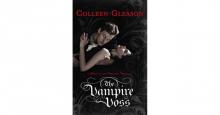 The Vampire Voss
The Vampire Voss Lavender Vows
Lavender Vows Sanctuary of Roses
Sanctuary of Roses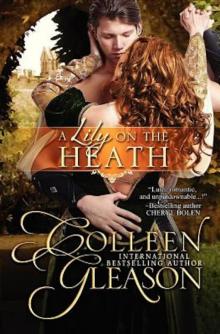 A Lily on the Heath
A Lily on the Heath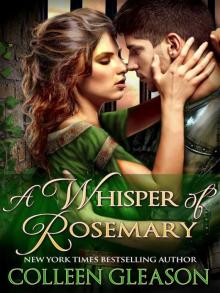 A Whisper Of Rosemary
A Whisper Of Rosemary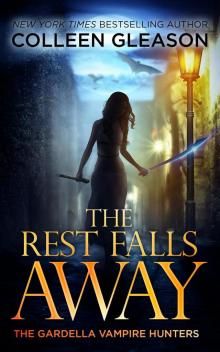 The Rest Falls Away
The Rest Falls Away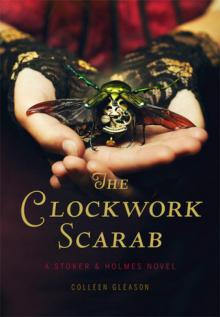 The Clockwork Scarab
The Clockwork Scarab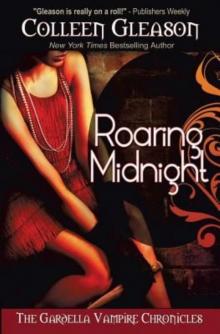 Roaring Midnight
Roaring Midnight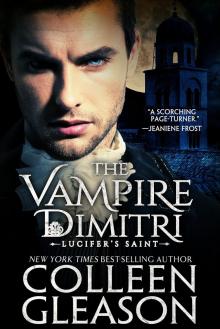 The Vampire Dimitri
The Vampire Dimitri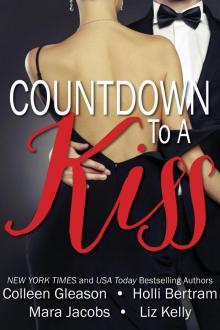 Countdown To A Kiss A New Years Eve Anthology
Countdown To A Kiss A New Years Eve Anthology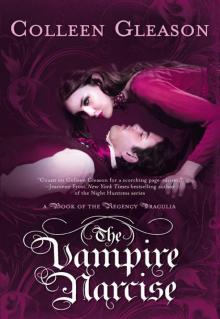 The Vampire Narcise
The Vampire Narcise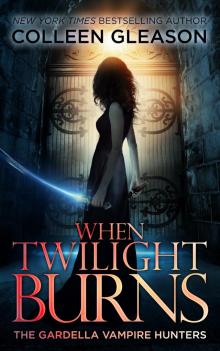 When Twilight Burns
When Twilight Burns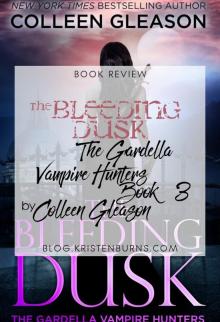 The Bleeding Dusk
The Bleeding Dusk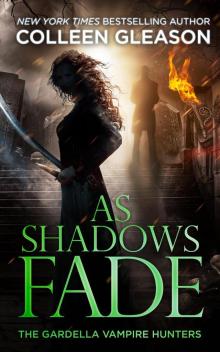 As Shadows Fade
As Shadows Fade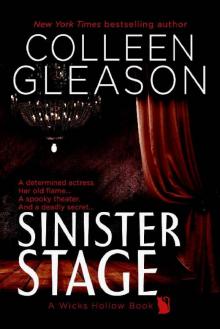 Sinister Stage: A Ghost Story Romance and Mystery (Wicks Hollow Book 5)
Sinister Stage: A Ghost Story Romance and Mystery (Wicks Hollow Book 5)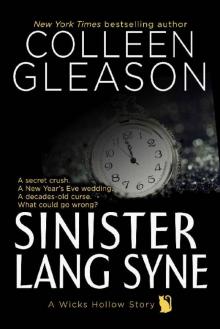 Sinister Lang Syne: A Short Holiday Novel (Wicks Hollow)
Sinister Lang Syne: A Short Holiday Novel (Wicks Hollow)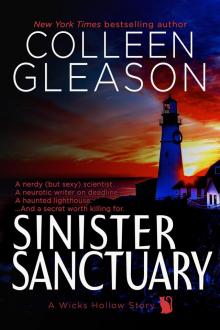 Sinister Sanctuary
Sinister Sanctuary Night Beckons
Night Beckons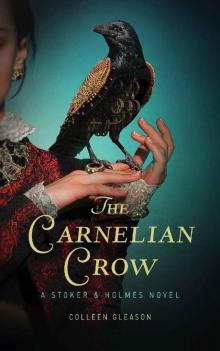 The Carnelian Crow: A Stoker & Holmes Book (Stoker and Holmes 4)
The Carnelian Crow: A Stoker & Holmes Book (Stoker and Holmes 4)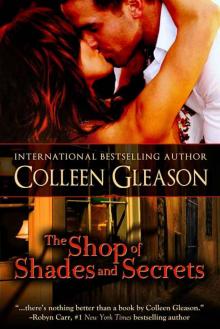 The Shop of Shades and Secrets (Modern Gothic Romance 1)
The Shop of Shades and Secrets (Modern Gothic Romance 1) Lavender Vows tmhg-1
Lavender Vows tmhg-1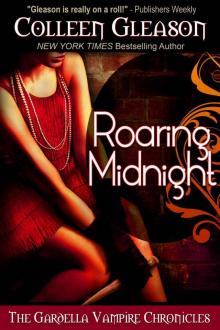 Roaring Midnight (The Gardella Vampire Chronicles | Macey #1)
Roaring Midnight (The Gardella Vampire Chronicles | Macey #1) Lavender Vows (The Medieval Herb Garden Series)
Lavender Vows (The Medieval Herb Garden Series) Dark Secrets: A Paranormal Romance Anthology
Dark Secrets: A Paranormal Romance Anthology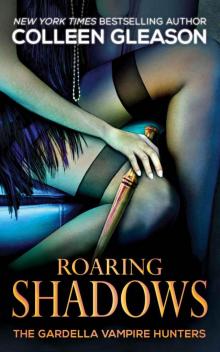 Roaring Shadows
Roaring Shadows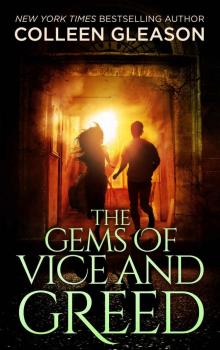 The Gems of Vice and Greed (Contemporary Gothic Romance Book 3)
The Gems of Vice and Greed (Contemporary Gothic Romance Book 3)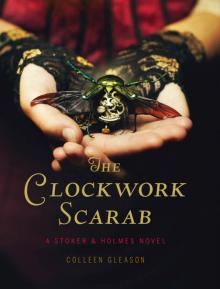 The Clockwork Scarab s&h-1
The Clockwork Scarab s&h-1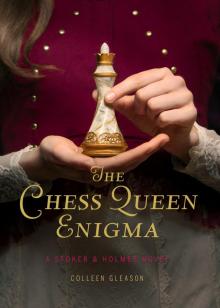 The Chess Queen Enigma
The Chess Queen Enigma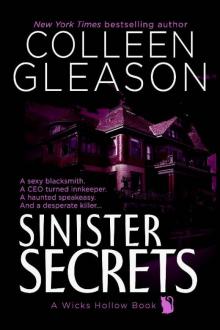 Sinister Secrets
Sinister Secrets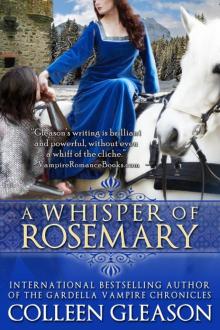 A Whisper of Rosemary (The Medieval Herb Garden Series)
A Whisper of Rosemary (The Medieval Herb Garden Series) Dark and Damaged: Eight Tortured Heroes of Paranormal Romance: Paranormal Romance Boxed Set
Dark and Damaged: Eight Tortured Heroes of Paranormal Romance: Paranormal Romance Boxed Set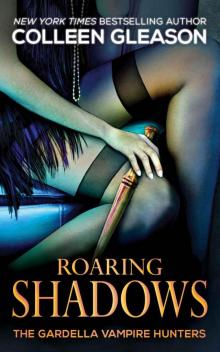 Roaring Shadows: Macey Book 2 (The Gardella Vampire Hunters 8)
Roaring Shadows: Macey Book 2 (The Gardella Vampire Hunters 8)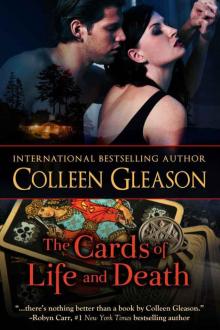 The Cards of Life and Death (Modern Gothic Romance 2)
The Cards of Life and Death (Modern Gothic Romance 2)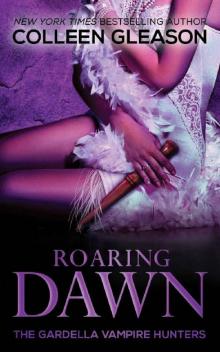 Roaring Dawn: Macey Book 3 (The Gardella Vampire Hunters 10)
Roaring Dawn: Macey Book 3 (The Gardella Vampire Hunters 10)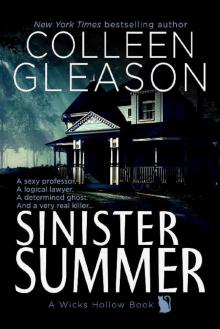 Sinister Summer
Sinister Summer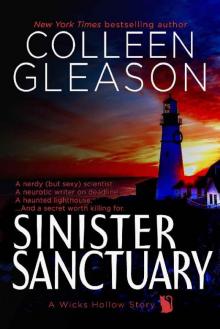 Sinister Sanctuary: A Ghost Story Romance & Mystery (Wicks Hollow Book 4)
Sinister Sanctuary: A Ghost Story Romance & Mystery (Wicks Hollow Book 4)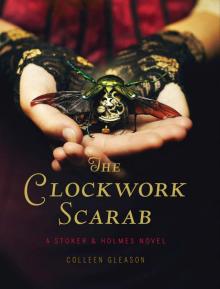 The Clockwork Scarab: A Stoker & Holmes Novel
The Clockwork Scarab: A Stoker & Holmes Novel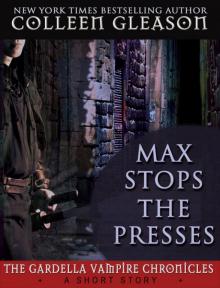 Max Stops the Presses
Max Stops the Presses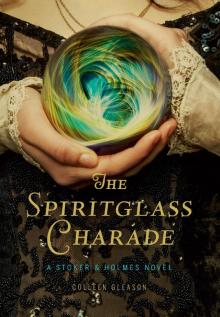 The Spiritglass Charade
The Spiritglass Charade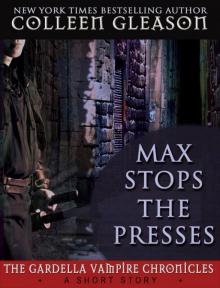 Max Stops the Presses: A Gardella Vampire Chronicles Short Story
Max Stops the Presses: A Gardella Vampire Chronicles Short Story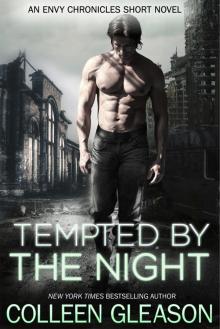 Tempted by the Night
Tempted by the Night